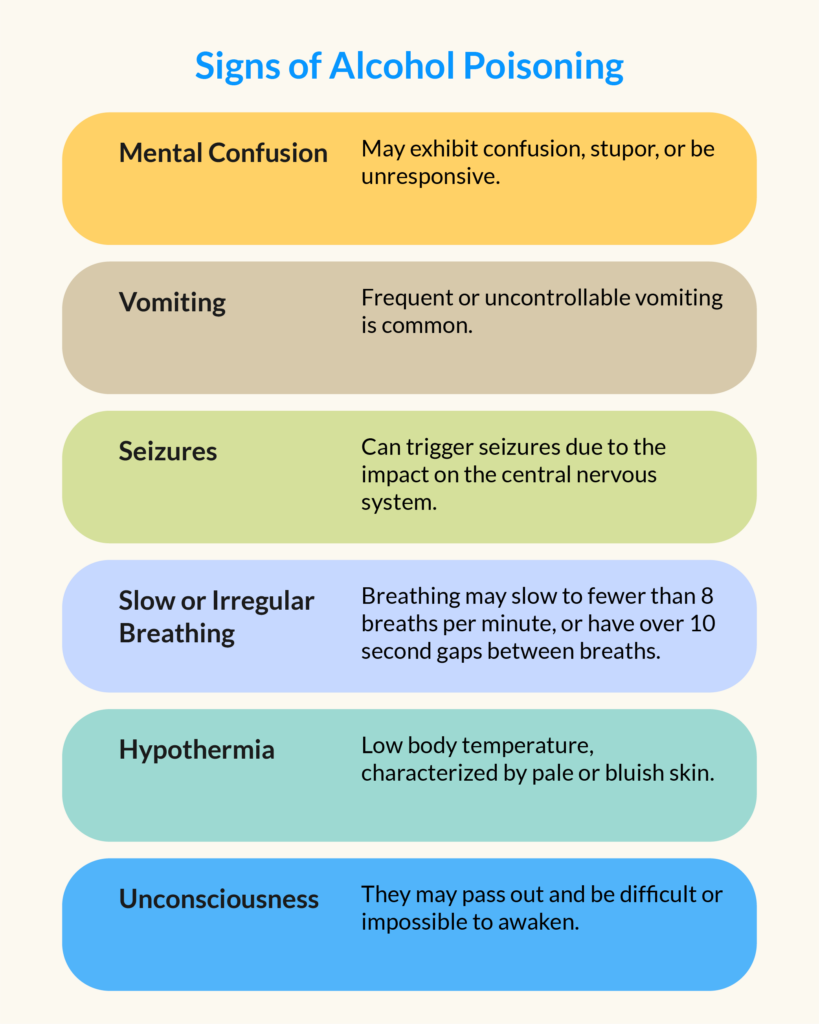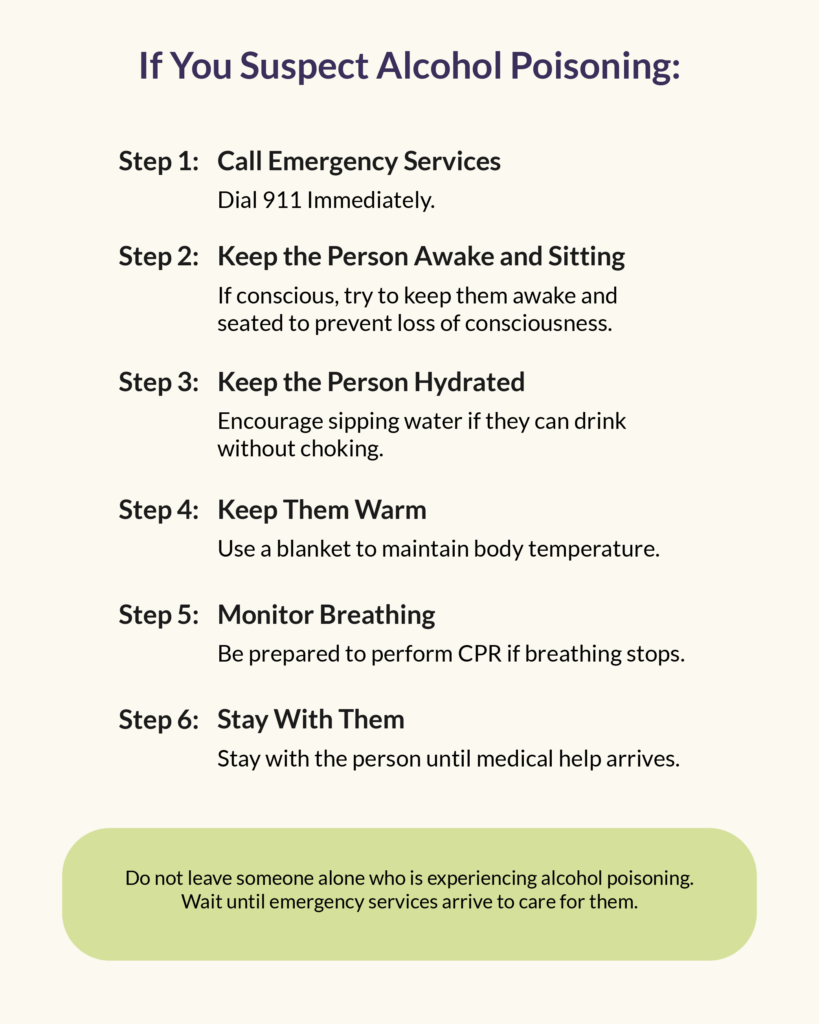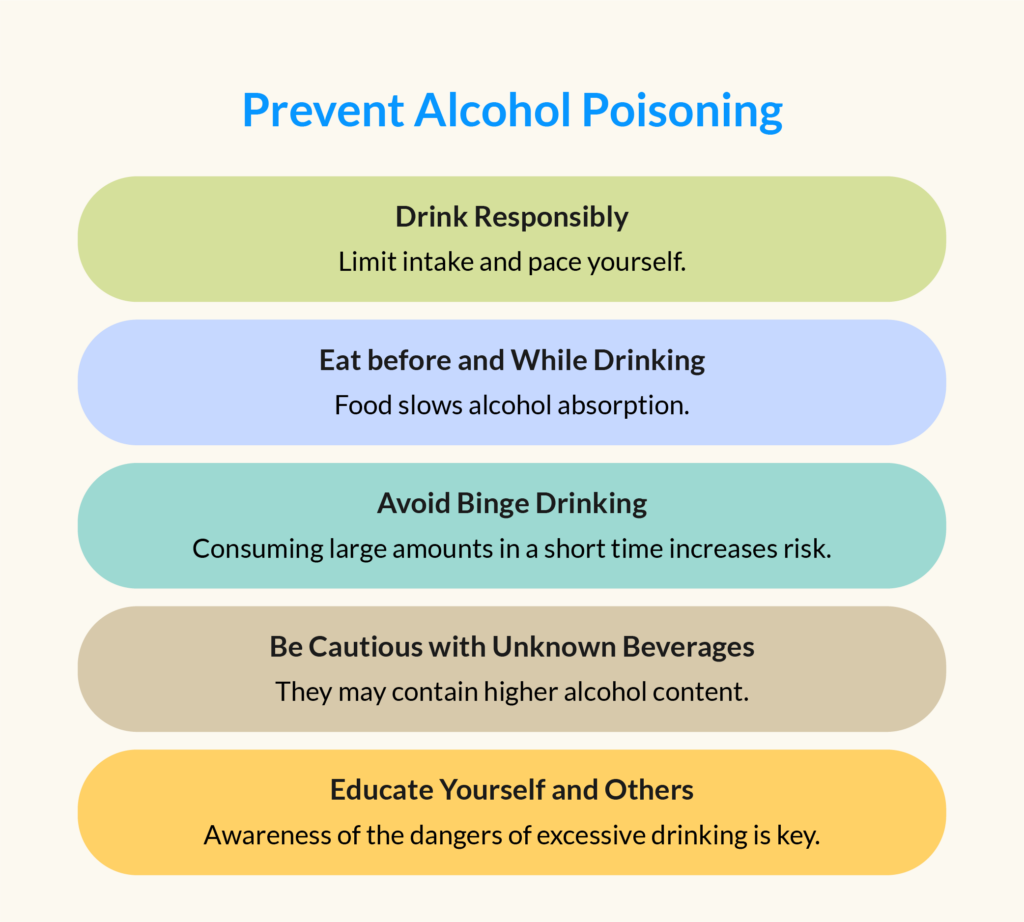Alcohol poisoning causes severe and potentially fatal consequences after consuming large amounts of alcohol in a short amount of time. Those suffering from alcohol addiction are at the biggest risk of alcohol poisoning. Recognizing the signs of alcohol poisoning and understanding the appropriate treatment steps are crucial in preventing long-term health complications or fatality.
What Is Alcohol Poisoning?
When a person consumes alcohol fast, the liver struggles to process it efficiently, leading to a toxic buildup in the bloodstream. This condition can depress vital bodily functions, including breathing, heart rate, and temperature control, potentially resulting in coma or death.
Signs of Alcohol Poisoning

Identifying alcohol poisoning early can save lives. Any case of alcohol poisoning should be treated by medical professionals. If you suspect you or someone else is experiencing alcohol poisoning, contact emergency medical services right away. Oftentimes, alcohol poisoning is not something that a person can “wait out”. Medical professionals can provide IV fluids, oxygen therapy, dialysis, stomach pumping, and more to help remove toxins from the body and filter alcohol from the blood.
Key symptoms of alcohol poisoning to watch out for include:
- Mental Confusion: The individual may exhibit confusion, stupor, or be unresponsive.
- Vomiting: Frequent or uncontrollable vomiting is a common sign.
- Seizures: Alcohol poisoning can trigger seizures due to its impact on the central nervous system.
- Slow or Irregular Breathing: Breathing may slow to fewer than eight breaths per minute or have gaps of more than 10 seconds between breaths.
- Hypothermia: Low body temperature, characterized by pale or bluish skin, can occur.
- Unconsciousness: The person may pass out and be difficult or impossible to awaken.
These symptoms indicate that someone suffering from alcohol poisoning is experiencing a medical emergency. Following treatment for alcohol poisoning, someone suffering from alcohol addiction should seek treatment first through a detox program, followed by inpatient or outpatient alcohol addiction treatment.
How to Get Rid of Alcohol Poisoning

If you suspect you or someone else has alcohol poisoning, it should immediately be addressed by emergency medical services. Take the following steps when someone has alcohol poisoning:
Step 1: Call Emergency Services: Dial 911 immediately.
Step 2: Keep the Person Awake and Sitting: If conscious, try to keep them awake and seated to prevent loss of consciousness.
Step 3: Keep the person hydrated. Encourage sipping water if they can drink without choking.
Step 4: Keep them warm. Use a blanket to maintain body temperature.
Step 5: Monitor breathing. Be prepared to perform CPR if breathing stops.
Step 6: Stay with the person until medical help arrives.
Avoid common myths such as letting the person “sleep it off” or giving them coffee. These actions do not counteract alcohol poisoning. In some cases, these actions can even make their symptoms worse. Do not leave someone alone who is experiencing alcohol poisoning. Wait until emergency services arrive to care for them.
Treatment for Alcohol Poisoning
Medical professionals will provide treatments such as intravenous fluids, oxygen therapy, and monitoring of vital signs. In severe cases, they may perform gastric lavage or administer medications to prevent further absorption of alcohol. Timely medical intervention is essential to reduce the risk of severe complications, including brain damage or death.
Following treatment for alcohol poisoning from emergency services, the best course of action for those suffering from alcohol addiction is to go through a detox program. Most alcoholics experience symptoms of withdrawal only 6 hours after their last drink. A detox program, also tended to by medical professionals who can monitor the symptoms, is a safe way of getting the body used to not consuming alcohol. However, symptoms of withdrawal can be as serious as alcohol poisoning itself. Detox, for this reason, is best done in a controlled center monitored by a staff of mental health and medical professionals.
How to Prevent Alcohol Poisoning

There are plenty of preventative measures one should take to avoid alcohol poisoning, including:
- Drink Responsibly: Limit intake and pace yourself.
- Eat Before and While Drinking: Food slows alcohol absorption.
- Avoid Binge Drinking: Consuming large amounts in a short time increases risk.
- Be Cautious with Unknown Beverages: They may contain higher alcohol content.
- Educate Yourself and Others: Awareness of the dangers of excessive drinking is key.
If you or someone you know struggles with alcohol use, resources are available. Behavioral Health Centers offer inpatient and outpatient treatment for alcohol addiction and abuse.
Recognizing the signs of alcohol poisoning and responding swiftly can make the difference between life and death. Always drink responsibly and stay informed to protect yourself and others.









